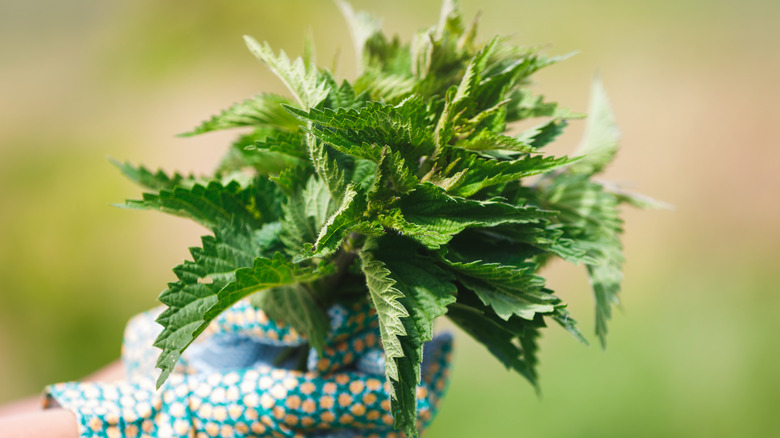Nettle Tea Is A Powerhouse Drink That May Help With Diabetes And Allergy Symptoms
You might expect a plant that stings skin on contact to contribute little to your health. But stinging nettle, a North American weed that grows wild but is relatively easy to cultivate, can be transformed into a powerhouse drink with beneficial properties.
Although stinging nettle produces flowers, its leaves hold the key to its nutritional upsides. When they're fresh, nettle leaves contain a variety of nutrients, including antioxidants, fiber, and vitamins A and C. When dried and steeped into tea form, the leaves retain and release their impressive array of nutrients, leaving you with a warm beverage that may help you control your blood sugar or fight the most annoying symptoms of seasonal allergies.
The blood sugar-lowering properties of nettle tea stem from the presence of UD-1, a compound that's been shown to stabilize how quickly the body metabolizes sugar. This stabilizing effect can keep you from undergoing the detrimental and uncomfortable signs that your blood sugar is too high, like making repeated bathroom trips to urinate and feeling fatigued.
Blood sugar maintenance support
The sugar-controlling capabilities of stinging nettles have been better documented in animal studies than in ones on human participants. However, a 2022 review in the Iranian Journal of Basic Medical Sciences did find enough evidence to support the plant's blood sugar management promise. The review noted that studies appeared to show that the stinging nettle had a two-fold effect on blood sugar. First, it enhanced and encouraged normal insulin functioning. Second, it allowed for more efficient glucose metabolization.
Some experts like registered dietitian Michela Palma recognize nettle tea as a potential food that may be a blood sugar management support tool. But in Palma's case, she says the tea comes with a critical catch: You should view it as a complementary therapy, not a primary or sole one. As she explained in a Cleveland Clinic interview, "Nettle shouldn't be used as a substitute for diabetic medications." Her parting thoughts? Avoid thinking of the tea as a replacement for doctor-prescribed medical care and view it as an enhancer of a healthy diet.
Sneeze and sniffle less frequently
Nettle tea may come in handy when you start to feel symptoms of seasonal allergies like watery eyes, an itchy throat, and a stuffy nose. After one month of taking a nettle-based product, participants in a 2017 clinical study in the Iranian Journal of Pharmaceutical Research reported a significant decrease in their allergy symptoms. That said, the study noted that a control group that was given a placebo also experienced improvements in their allergies, so more experiments may be warranted.
A 2024 review in Molecules of the possible histamine-blocking effects of stinging nettles came to a similar conclusion. Insights from lab experiments indicated that nettles likely inhibit histamine, but additional studies are needed to prove the efficacy of nettles as a viable allergy treatment.
Before you cozy up with a cup of nettle tea to test its merit, know that it does have a couple of downsides. Consuming nettle may interfere with blood pressure drugs. Additionally, nettle tea may act as a diuretic. To be safe, speak with your physician before adding it into your regular beverage lineup.


